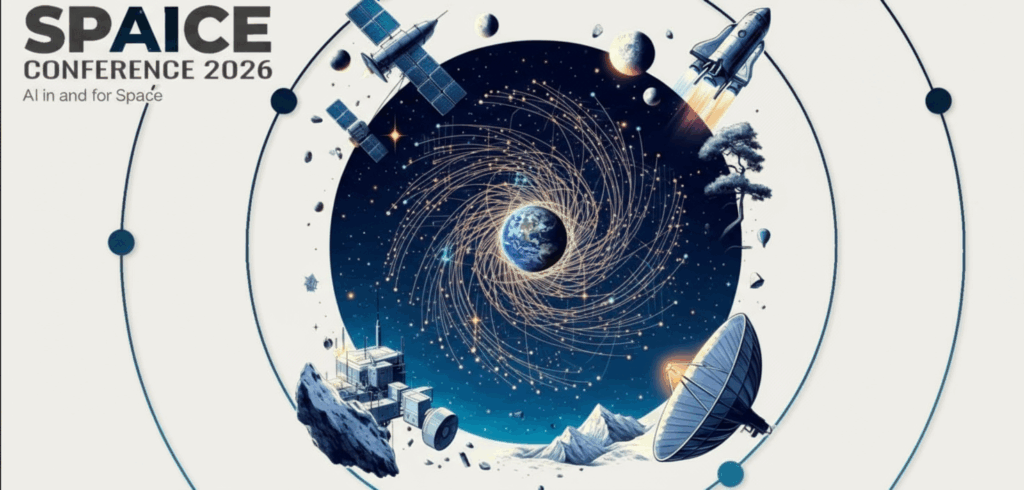
SPAICE 2026 envisions a vivid exchange of ideas, concepts, and challenges between the fields of AI and space, building a bridge between them. Thus, we encourage a broad range of scientists from both fields to submit their ideas and work. Specifically, we invite researchers and engineers from the space domain to contribute their work on applying AI methods to space applications. Similarly, we invite researchers and engineers from the AI area to contribute work on novel methods they believe would be of high impact and interest to the space domain.
To contribute to SPAICE 2026, please submit a short paper of up to 4 pages (excluding references, acknowledgments, and data, ethics or funding statements). Submitted papers should contain original and unpublished research focusing on both novel/emerging AI techniques and/or their applications to specific space domains (see below for a non-exhaustive list of covered topics). Papers can be selected for oral or poster presentations following a single round of double-blind peer review. Authors of papers accepted for an oral or poster presentation will be invited to submit a revised manuscript for inclusion in the conference proceedings. Template and submission guidelines can be found below. Submissions will be processed via the OpenReview platform (submission link). The submission deadline is 9.03.2026 (March). Notification of acceptance will be 1.06.2026 (June).
Please be aware that OpenReview has a moderation policy for newly created profiles: New profiles created without an institutional email will go through a moderation process that can take up to two weeks. New profiles created with an institutional email will be activated automatically. If you have any questions about the use of OpenReview, please refer to its FAQ: https://openreview.net/faq
All published papers as well as the proceedings will be indexed (with DOI) and archived (open access) using the Zenodo platform hosted by CERN under the SPAICE Zenodo Community.
We strongly support open science practices and, therefore, will make the conference proceedings publicly available under the CC-BY-4.0 licence. Authors of accepted papers retain the copyright of their work and are free to use it in follow-up publications. We further encourage authors to share their accepted publications on pre-print servers such as arXiv with a reference to the SPAICE 2026 conference.
For an accepted paper to be included in the proceedings of SPAICE 2026, at least one of the paper’s authors has to be registered and attend the conference in person to present their work. Authors can only register and present their own papers.
Topics
Covered topics in SPAICE 2026 will mainly, but not exclusively, focus on the following application domains and AI techniques.
Application domains
- Guidance, Navigation, and Control
- Astrophysics and Astronomy
- Spacecraft Operations
- Mission Planning and Scheduling
- On-board AI (hardware and software)
- Earth Observation
- Telecommunications
- Robotics
- Materials and Habitats
- Satellite Communication and Networking
AI techniques
- Deep learning architectures (transformers, convolutional neural networks, autoencoders, graph neural networks, physics-informed neural networks, …)
- Shallow learning architectures (decision trees, kernel machines, Gaussian processes, AutoML, reservoir computing, …)
- Probabilistic and causal models (Bayesian inference, generative models, …)
- Optimisation and control (evolutionary & genetic algorithms, reinforcement learning, …)
- Efficient learning paradigms (zero-shot learning, one-shot learning, few-shot learning, continual learning, meta-learning, …)
- Theory and foundations of AI (computational complexity, search and optimisation, logic and symbolic methods, generalisation bounds, explainability, interpretability, robustness,…)
- Natural language processing (large language models, reasoning, …)
- Computer Vision (image segmentation, object detection, …)
- Neuro-inspired AI (spiking neural networks, neuromorphic computing, analog computing, …)
- Emerging hardware systems (quantum computations in ML pipelines, AI accelerators, in-memory computing, hardware/software co-design, …)
- Evaluation (methodology, metrics, benchmark datasets, meta studies, …)
- Social and economic aspects of machine learning (energy demands, environmental impact, data privacy, governance, security, …)
Keep these in mind when selecting keywords for your paper submission. If your work on AI and space does not fall in any of these application domains and/or AI techniques, you can provide additional keywords that describe your work in more detail.
Submission template and guidelines
The following LaTeX template is mandatory to prepare the short paper: Template_SPAICE_2026.
In order to ensure a uniform look of the conference proceedings, do not adjust the provided template style (no changes to the font size, page geometry, etc. are permitted). A guideline and typesetting examples are provided within the template. The following key guidelines should be followed when preparing the short paper:
- The maximum page limit is 4 pages, excluding references, acknowledgments, as well as data, ethics, and funding statements.
- The short paper should contain the following sections: an abstract (200 words maximum), an introduction, results, and a discussion. Additional sections and subsections can be added as required.
- The paper must be submitted with authors and affiliations removed. This is done by using the “SPAICE” LaTeX class with the “doubleblind” option, as indicated in the template. Please also remove or anonymise any links to material that might indicate your identity. Similarly, when citing your own work, do it in a neutral way that does not reveal your identity.
- You must submit the compiled PDF file of your paper to be considered for the conference. If you are new to LaTeX, we recommend you to use the online editor Overleaf to prepare your manuscript. To start writing the paper, click on “New Project” at the top left, select “Upload Project”, and then drag and drop the LaTeX template (a zip folder named “Template_SPAICE_2026”) provided at the beginning of this section into the menu that pops up.
Contact
For questions regarding the submission, please contact spaice.conference@gmail.com